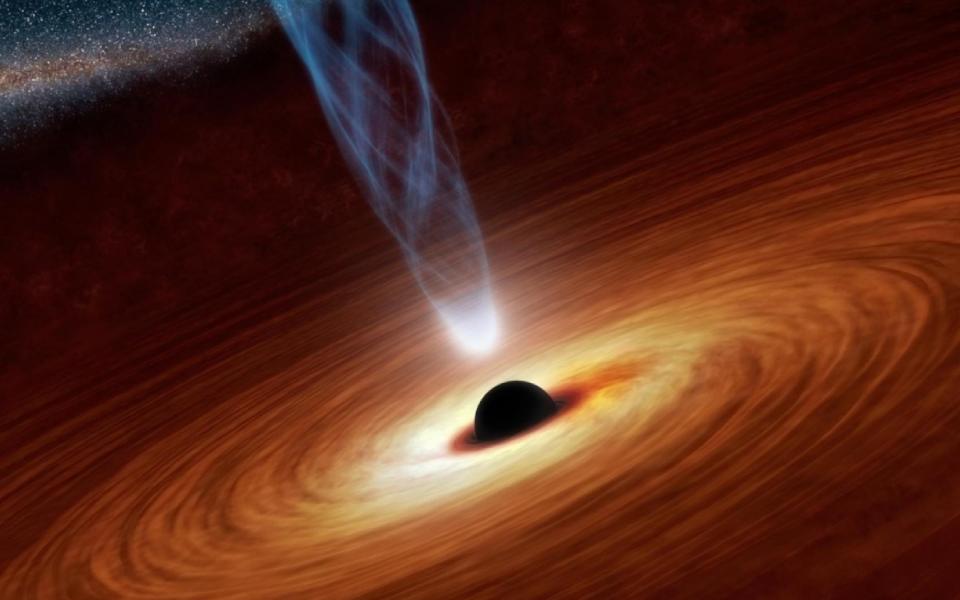New Delhi, Jan 18: Researchers have discovered the oldest black hole ever observed, dating from the dawn of the universe, and found that it is 'eating' its host galaxy to death.
The research, published in the journal Nature, used the the James Webb Space Telescope (JWST) to detect the black hole, which dates from 400 million years after the Big Bang, more than 13 billion years ago.
That this surprisingly massive black hole—a few million times the mass of our sun—even exists so early in the universe challenges the assumptions about how black holes form and grow, the researchers said.
Astronomers believe that the supermassive black holes found at the centre of galaxies like the Milky Way grew to their current size over billions of years.
However, the size of this newly-discovered black hole suggests that they might form in other ways.
According to standard models, supermassive black holes form from the remnants of dead stars, which collapse and may form a black hole about a hundred times the mass of the Sun.
If it grew in an expected way, this newly detected black hole would take about a billion years to grow to its observed size. However, the universe was not yet a billion years old when this black hole was detected.
"It's very early in the universe to see a black hole this massive, so we've got to consider other ways they might form," said lead author Roberto Maiolino, Professor at Cambridge University, UK.
"Very early galaxies were extremely gas-rich, so they would have been like a buffet for black holes," Maiolino said.
Like all black holes, this young one is devouring material from its host galaxy to fuel its growth. Yet, this ancient black hole is found to gobble matter much more vigorously than its siblings at later epochs, the researchers said.
The young host galaxy, called GN-z11, glows from such an energetic black hole at its center. Black holes cannot be directly observed, but instead they are detected by the tell-tale glow of a swirling accretion disk, which forms near the edges of a black hole, they said.
The gas in the accretion disk becomes extremely hot and starts to glow and radiate energy in the ultraviolet range. This strong glow is how astronomers are able to detect black holes.
GN-z11 is a compact galaxy, about one hundred times smaller than the Milky Way, but the black hole is likely harming its development, according to the researchers.
When black holes consume too much gas, it pushes the gas away like an ultra-fast wind. This 'wind' could stop the process of star formation, slowly killing the galaxy, but it will also kill the black hole itself, as it would also cut off the black hole's source of 'food', they said.
"It's a new era: the giant leap in sensitivity, especially in the infrared, is like upgrading from Galileo's telescope to a modern telescope overnight," Maiolino said.
The sensitivity of JWST means that even older black holes may be found in the coming months and years, he added.
Let the Truth be known. If you read VB and like VB, please be a VB Supporter and Help us deliver the Truth to one and all.
Kalaburagi: Four men have been arrested in Kalaburagi on charge of hacking a man with lethal weapons and pelting stones at him under the limits of Station Bazaar Police Station recently.
According to police sources, Anand Jalak Shinde (34), Ashitosh Jalak Shinde (30), Imran Mehboob Sheikh (28) and Sohaib Anwar Qureshi have been arrested. The men are accused of the brutal murder of Syed Mehboob, a resident of Station Bazaar Upper Line Hamalawadi in the city.
An FIR was filed by the Station Bazaar Police Station based on a complaint given by Syed Ismail, father of the deceased Syed Mehboob.
Following quick probe, the police team successfully arrested the suspects within 24 hours. The arrested men were produced in court and have been sent to judicial custody.
The City Police Commissionerate has appreciated in an official release the police team’s quick solving of the murder case and arrest of the four men accused of murdering Syed Mehboob.





